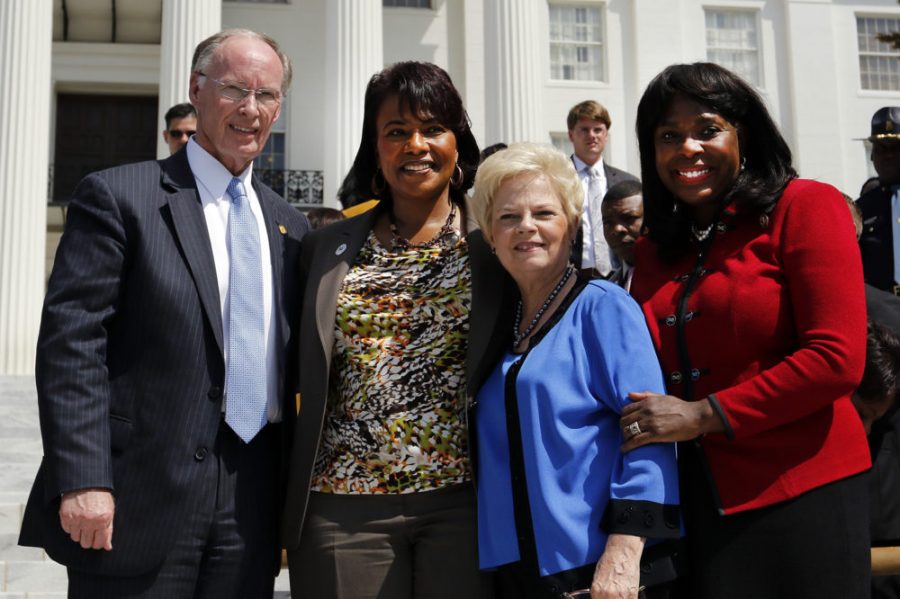Peggy Wallace Kennedy bringing ‘The Broken Road’ book tour to two Montgomery bookstores
Governor Robert Bentley, Dr. Bernice King, Peggy Wallace Kennedy, and Congresswoman Terri Sewell stand together in front of a crowd of people gathered at the steps of the Alabama State Capitol after a march from Selma, Ala., Wednesday, March 25, 2015, in Montgomery, Ala. The daughters of Martin Luther King Jr. and former Alabama Gov. George Wallace, shared a stage on the steps of the Alabama Capitol on Wednesday to mark the 50th anniversary of the 1965 Selma-to-Montgomery voting rights march. (AP Photo/Butch Dill)
December 3, 2019
Montgomery’s own Peggy Wallace Kennedy has been widely hailed as the “symbol of racial reconciliation.”
In the summer of 1963, she was just a young girl watching her father stand in a schoolhouse door as he tried to block two African-American students from entering the University of Alabama. This man, former governor of Alabama and presidential candidate George Wallace, was notorious for his hateful rhetoric and his political stunts.
But he was also a larger-than-life father to his daughter, who was taught to smile, sit straight, and not speak up as her father took to the political stage.
At the end of his life, Wallace came to renounce his views, although he could never attempt to fully repair the damage he caused.
Kennedy, after her own political awakening, dedicated her life to spreading the new Wallace message – one of peace and compassion.
Two years ago, as Gov. Kay Ivey was taking office, Kennedy was asked how her father shaped influenced opinions.
“His politics are not my politics,” Kennedy answered.
In her powerful new memoir, Kennedy looks back on the politics of her youth and attempts to reconcile her adored father with the man who coined the phrase “Segregation now. Segregation tomorrow. Segregation forever.”
That book, “The Broken Road” speaks to change, atonement, activism and racial reconciliation.
Kennedy will be at two book signings in Montgomery in the days ahead:
Tuesday, Dec. 3, 7-8 p.m. at Books-A-Million, 7074 East Chase Parkway, Montgomery
Tuesday, Dec. 10, 5:30-8:30 p.m. at Read Herring, 105 S. Court Street, Montgomery
Kennedy is a nationally recognized speaker, lecturer and writer. She has received, among others, the Southern Christian Leadership Conference Rosa Parks Legacy Award, the Emmett Till Legacy Foundation Woman of Courage Award, the Brown Foundation Human Rights Award, and the MLK Commission Award.
Publishers Weekly calls her memoir “a probing record of politics and racism in the South.”







